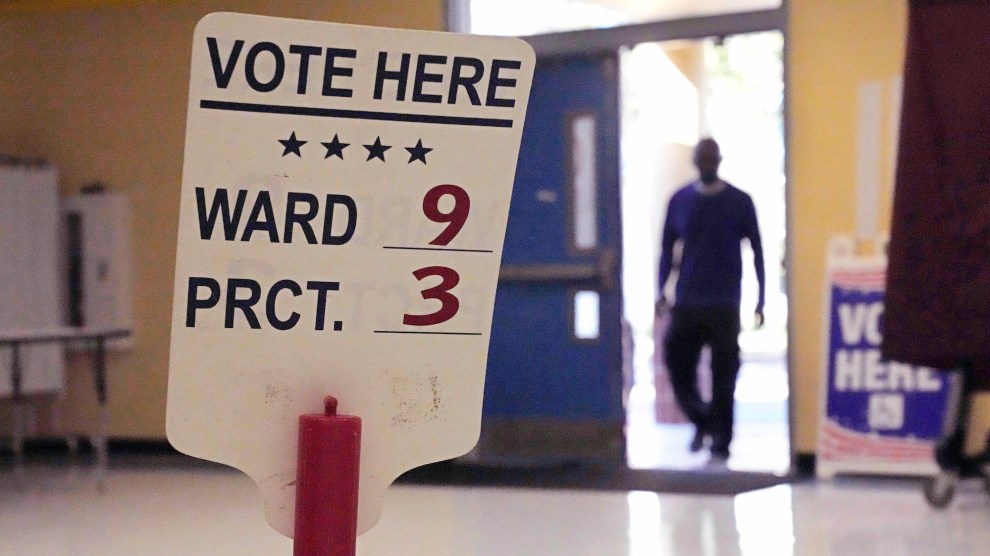House Democrats went limping into August recess, having watched a president with historically low public support nonetheless cram his surveillance agenda past them. At Speaker Nancy Pelosi’s behest, the Judiciary Committee made rejoining the battle its first order of business upon returning this week. It remains unclear, however, whether they’ve come to the fight too late.
As Congress approached the end of session late in July, Democrats faced a major dilemma: pass the president’s surveillance agenda, or leave for recess before reaching any agreement at all and suffer a month of political attacks at the hands of Republicans. By the time Congress began debating the issue in earnest, the rhetoric had already escalated. In a weekly radio address given late in July, President Bush contended that, “every day that Congress puts off these reforms increases the danger to our nation.”
On August 3, the Senate passed a Republican-sponsored bill by a margin of 60-28. The bill gave the Bush administration everything it asked for in an updated Foreign Intelligence Surveillance Act, or FISA. In rapid succession, the House passed the same bill by a vote of 227-183 the following day, and the president signed it into law a day later.
A furious Pelosi (D-Calif.) immediately sent a letter to both Texas Rep. Silvestre Reyes, chair of the Permanent Select Committee on Intelligence, and Michigan Rep. John Conyers, chair of the Judiciary Committee, demanding the new FISA law be neutered. “Many provisions of this legislation are unacceptable, and, although the bill has a six month sunset clause, I do not believe the American people will want to wait that long before corrective action is taken. Accordingly, I request that your committees send to the House, as soon as possible after Congress reconvenes, legislation which responds comprehensively to the Administration’s proposal while addressing the many deficiencies.”
But Judiciary Committee aides say meeting such an ambitious timeline may be easier ordered than done. They are not at all certain they can move legislation that would survive a presidential veto before the February 2008 sunset.
Still, the committee leaders are working quickly to determine what their FISA remake would look like. The Judiciary Committee’s first full hearing after recess Wednesday featured testimony from a panel that included the Open Society Institute’s Morton Halperin, who was instrumental in crafting the original FISA statute, and former Georgia Republican Rep. Bob Barr, who once served as a conservative attack dog on the committee but is also deeply concerned about the government overreaching in its domestic surveillance efforts.
The debate was a familiar one: Everybody agreed that the president should have the authority to intercept communications between two suspects when both are in foreign countries—so-called foreign-to-foreign communication—but disagreed on just about every other point of order.
Democrats took issue with the president’s desire to retroactively immunize telecommunication companies who may have violated the law by complying with National Security Agency requests. And they highlighted loose language within the new law that could give NSA access to calls that are between two people in the United States, but “concerning” foreign suspects.
Democrats also registered ongoing objections with provisions that allow the NSA to spy on American citizens without as much as seeking a retroactive warrant from the FISA court. Republicans repeated the assertion that acquiring retroactive warrants would create a bureaucratic nightmare and hamper counter-terrorism efforts.
Barr sought to play broker, suggesting there is truth on both sides and room for compromise. “In terms of speed and agility, the solution in FISA is to permit emergency surveillances until you get a warrant,” Barr offered. “I think that the emergency procedures are not flexible enough, and I think Congress ought to be willing to consider proposals to extend the emergency procedures.” He added, “I think everybody would support an amendment that said you do not need a court order to conduct and surveill two people outside the United States.”
But a telling exchange between Rep. Bob Goodlatte (R-Va.) and Halperin suggested that the administration’s congressional supporters may simply not be interested in compromising.
“How is the government going to know in advance who an overseas target is going to contact when they make a call?” Goodlatte asked, suggesting a solution that sets up two surveillance categories with different rules is unworkable.
“But that just proves our point, not yours,” Halperin countered emphatically. “The government can’t know that it’s always intercepting the conversations of two people overseas. It may well be intercepting the conversation of men in America, and that’s precisely why it should require a warrant. Because it can’t be sure of what it will encounter.”
Goodlatte offered that “as soon as it’s determined that there’s a U.S. citizen involved in the conversation, I absolutely agree with you.”
The administration does not agree, however, and neither does the legislation Congress passed before recess. “That was a provision in the alternative bill,” Halperin noted, “that the administration insisted be taken out.”
The exchange raises uncomfortable questions about how well members of Congress actually understood the legislation they passed—and about the extent to which Republican support was purely partisan. And it suggests that the fight we saw in August—such as it was—may well continue into next year.















